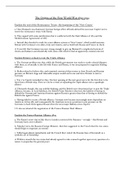The Origins of the First World War 1890-191
Explain the end of the Reinsurance Treaty, the beginning of the 'New Course'
a. Once Bismarck was dismissed, German foreign office officials advised his successor Caprivi not to
renew the reinsurance treaty with Russi
b. They argued with some justification that it conflicted with the Dual Alliance of 1879 and the
Mediterranean Agreements of 188
c. Instead they decided to work for a new alliance system or ‘New Course’, which would associate
Britain with Germany’s two allies, Italy and Austria, and so hold both Russia and France in chec
d. It was felt that Germany was now strong enough to give up Bismarck’s complicated system of
checks and balances and should ally with states with which it had an apparently common interes
Explain Britain's refusal to join the Triple Alliance
a. The German problem was that, while the British government was ready to settle colonial disputes
with them, as eventually it also did with France and Russia, it was not prepared to negotiate binding
alliance
b. Berlin refused to believe this, and remained convinced that sooner or later French and Russian
pressure on Britain’s large and vulnerable empire would end in war and force Britain to turn to
German
c. ‘For s’ as Caprivi remarked in 1893, ‘the best opening of the next great war is for the first shot to be
fired from a British ship. Then we can be certain of expanding the triple alliance into a quadruple
allianc
d. Ultimately though, this was wishful thinking, and the British were determined not to join the Triple
Alliance, because, as Lord Salisbury, the British Prime Minister observed, the liability of having to
defend the German and Austrian frontiers against Russia is greater than that of having to defend the
British isles against Franc
e. Having failed to secure a British alliance, Germany now became increasingly more dependent on
Austria as its key ally, and consequently the Austrians were in a position to put pressure on the
Germans to back them against Russia when the next major Balkans crisis erupte
f. It also accelerated the negotiation of the Franco-Russian Dual Allianc
Explain the Franco-Russian Alliance 1894
a. The Kaiser’s state visit in July 1891 to London convinced the Russians – wrongly – that Britain and
Germany had a secret allianc
b. Nikolay Giers, the Russian Foreign Minister, therefore suggested to the French that the two states
should begin to negotiate an entent
c. Talks began almost immediately and the French fleet visited the Russian base of Kronstadt as a
symbolic act of friendshi
d. Within a month the two states had already agreed to take counsel together upon every question of a
nature to jeopardise the general peac
4
, e. A year later this was backed up with a secret defensive military agreement which was approved by
both governments in January 1984
i. Russia would assist France with ‘all her available forces’ if it was attacked by Germany or Italy
supported German
ii. France would do the same for Russia if it was attacked by Germany or Austria backed by German
iii. The Treaty was to last as long as the Triple Allianc
f. The Treaty marked the end of France’s isolation in Europe and even though its precise terms were
secret, fuelled German fears that in any future war France and Russia would be allie
g. The potentially dangerous situation in which Germany now found itself was partly obscured by the
shift of European rivalries in the 1890’s from Europe and the Balkans to Africa and Chin
h. Outside Europe, Germany, France and Russia were able often to cooperate t the cost of the British
Empir
i. For a time Germany still remained confident that Britain, whose huge and vulnerable empire was
coming under intense pressure, would be forced into an agreement on Germany’s terms with the
Triple Alliance, but this, as we have seen, was a miscalculatio
Briefly outline the emergence of nationalism and great power rivalry
a. The 1890’s witnessed a renewed scramble for territory and influence in Africa and Asia by the Great
Powers joined by Japa
b. However, contrary to expectations, imperial rivalries in Africa and China did not lead to the
outbreak of a major war between the European powers, but they did encourage the growth of
nationalism, imperialism, militarism in each European countr
c. The struggle for empire was at its most intense in
• The Upper Nil
• South Afric
• Chin
Explain the Upper Nile and Fashoda Crisis
a. The French, bitterly resentful of Britain’s dominant position in Egypt, which it had acquired in 1882,
intended to seize a wide strip of territory right across central Africa from the Indian Ocean to the
Atlanti
b. Both Britain and France raced to control the territories of the Upper Nil
c. In September 1898 a small French force reached the Upper Nile first and hoisted the French flag t
Fashoda, but was confronted a few days later by an army under General Kitchener which had just
defeated the Sudanese force at Omdurma
d. An armed clash that could have led to war between Britain and France was avoided when Kitchener
decided not to use force to eject the Frenc
e. Instead it was left to the two governments to find a diplomatic solutio
f. France, deserted by both Russia and Germany had little option but to concede totally to British
demands in the Suda
:





